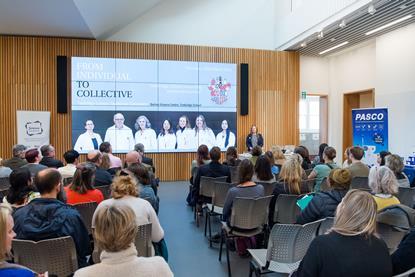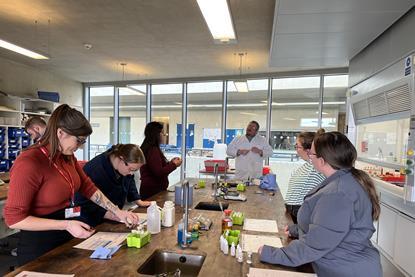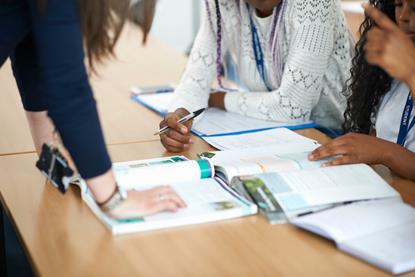- Home
- I am a …
- Resources
- Collections
- Remote teaching support
- Starters for ten
- Screen experiments
- Assessment for learning
- Microscale chemistry
- Faces of chemistry
- Classic chemistry experiments
- Nuffield practical collection
- Anecdotes for chemistry teachers
- Literacy in science teaching
- More …
- Climate change and sustainability
- Alchemy
- On this day in chemistry
- Global experiments
- PhET interactive simulations
- Chemistry vignettes
- Context and problem based learning
- Journal of the month
- Chemistry and art
- Classic chemistry demonstrations
- In search of solutions
- In search of more solutions
- Creative problem-solving in chemistry
- Solar spark
- Chemistry for non-specialists
- Health and safety in higher education
- Analytical chemistry introductions
- Exhibition chemistry
- Introductory maths for higher education
- Commercial skills for chemists
- Kitchen chemistry
- Journals how to guides
- Chemistry in health
- Chemistry in sport
- Chemistry in your cupboard
- Chocolate chemistry
- Adnoddau addysgu cemeg Cymraeg
- The chemistry of fireworks
- Festive chemistry
- Collections
- Education in Chemistry
- Teach Chemistry
- Events
- Teacher PD
- Enrichment
- Our work
- More navigation items
Chemistry Teaching Empowerment Fund
Strengthen local chemistry teaching with up to £600 (€700) of support
Tackle teaching challenges in chemistry. Get to know and share knowledge with your fellow chemistry teachers and technicians. Develop your leadership skills and strengthen your local network.
If you have an idea that will make an impact on chemistry teaching where you are, the Chemistry Teaching Empowerment Fund can help cover your costs.
Upcoming deadlines
The fund is currently closed. We will update this page with dates for the next round of funding soon.

Who can apply?
The fund is open to all teachers and technicians in the UK and Ireland, no matter the amount of experience you have.
You apply through Teach Chemistry, our free support service for secondary schools and colleges in the UK and Ireland, so please make sure that you are registered before applying.
How can I use the money?
The £600 (€700) offered by the fund counts towards the cost of a collaborative project or event. This includes your planning time. The scope is broad, but your idea must help to improve chemistry teaching in your area or help to build a strong, supportive network across local schools.
We particularly encourage applications for projects or events that:
- support teachers or technicians at schools that are in hard-to-reach areas, either due to geography or social disadvantage.
- support teachers or technicians planning for a curriculum change.
- support teachers or technicians facing challenges in chemistry teaching, such as a lack of experience with practicals, teaching outside their specialism, or maintaining their well-being.
Throughout your project, you can tap into the Royal Society of Chemistry’s (RSC’s) expertise and get advice on setting up your event or collaborative project. Just email us or contact your local education coordinator.
Do you work in a secondary school in Wales?
We can offer additional funding for events or collaborative projects in Wales that focus on planning for the new curriculum. Do you need help developing cross-curricular links or working across the science and technology area in your school or local authority? Do you want to set up a supportive network of teachers working towards implementing the new curriculum? We encourage you to apply to the Chemistry Teaching Empowerment Fund.
Schools in Wales can apply for up to £300 (€350) for a project or event that doesn’t involve teachers or technicians from other schools, and for the full £600 (€700) if your project or event involves teachers or technicians from beyond your own school.
Case Studies
Lisa’s science technician convention
Find out how Lisa organised her science technician convention and get tips for applying to the RSC Chemistry Teaching Empowerment Fund
Nicola’s practical skills training day
Find out how Nicola organised her practical skills training day and get tips for applying to the RSC Chemistry Teaching Empowerment Fund
Emma’s microscale chemistry CPD day
Find out how Emma organised her microscale chemistry CPD day and get tips for applying to the RSC Chemistry Teaching Empowerment Fund
Michael’s teaching resource
Find out how Michael created his teaching resource and get tips for applying to the RSC Chemistry Teaching Empowerment Fund
Daniella’s science technician support network
Find out how Daniella organised her science technician support network and get tips for applying to the RSC Chemistry Teaching Empowerment Fund
Matthew and Claire’s teacher and industry networking event
Find out how Matthew and Claire organised their networking event and get tips for applying to the RSC Chemistry Teaching Empowerment Fund
Eligibility criteria and restrictions
Collaborative projects or events could be online, in person or blend online and in-person meetings.
Applicants must be registered with Teach Chemistry to apply.
Eligible collaborative projects or events will fulfil the following criteria:
- The applicant must work in a school in the UK or Ireland and the event or project must take place in the UK or Ireland.
- The project or event must focus on improving chemistry teaching and/or fostering supportive and effective chemistry teaching communities.
- The project or event should either be new, or, if applied to an existing project or event, the funding must improve or introduce something new to it.
- It must involve teachers and/or technicians from more than one school. (For example, a collaborative project with teachers from multiple schools, or an online event that is open to teachers from hard-to-reach areas.)
- The applicant must agree to complete an evaluation of the project or event using the format provided by the RSC.
- Your local education coordinator will have an open invitation to attend the project or event.
- The project or event must not already have received funding from the RSC via another route.
Examples of eligible events
Projects or events that the fund can support include things like:
- A session for early career teachers to try out experiments that are required in exam specifications
- Setting up a local support network with termly webinars on a range of topics
- Workshops at which teachers share and develop plans for new or ‘recovery’ curricula
- A networking session for teachers and technicians to speak to chemists working in different industries
Examples of ineligible events
The fund cannot support:
- Class visits outside of school
- Projects or events unrelated to chemistry
- Activities which are pupil-facing
- Participation in existing programmes that aren’t organised by the applicant
If you are a secondary teacher wanting to run a project or event aimed at primary teachers, please apply through the Primary Science Teaching Empowerment Fund instead.
Restrictions on funding
- Funding is restricted to £600 (€700) per school per academic year.
- A maximum of £300 (€350) can be used for teaching cover so that you can plan the project or event.
How to apply
We use a survey to help guide you through the application and allow you to give concise answers.
The survey will ask you to provide:
- Your details
- Project/Event eligibility questions, including:
- Event name
- Project/event timeline including approximate start date and time span
- Detail around whether your project/event is new and who it will involve
- An outline of your project/event and detail about impact, including:
- A description of your project with aims and how you intended to achieve them, ie:
- Who the project is aimed at
- How you intend to run your event (for example, in person or online)
- What you will do to achieve your aims
- Detail about the lasting impact of the project/event and any support you will have
- Detail on how your project supports these fund focus areas:
- Supporting teachers or technicians at schools that are in hard-to-reach areas, either due to geography or social disadvantage.
- Supporting teachers or technicians planning for a curriculum change.
- Supporting teachers or technicians facing challenges in chemistry teaching such as a lack of experience with practicals, teaching outside their specialism, or maintaining their well-being.
- How the project will contribute to your professional development
- A breakdown of how you intend to use the money
- A description of your project with aims and how you intended to achieve them, ie:
Questions?
If you would like to check anything with us before you apply, or for any questions along the way, either send us an email or contact your local education coordinator.
Good luck with your application!


















